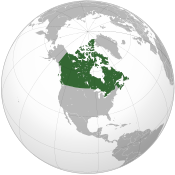Canada adds United States to list of countries that torture
Saturday, January 19, 2008
An internal training manual developed by the Canadian foreign affairs department lists the United States as a country where foreigners risk torture and abuse, alongside countries such as Afghanistan, China, Iran, Israel, Mexico, Saudi Arabia, and Syria. Both Israel and the United States are officially allies of Canada.
The manual is a 93-page PowerPoint presentation by the Foreign Affairs Department for Canadian diplomats and was accidentally given to lawyers for the human rights group Amnesty International. It aims to teach diplomats how to identify and aid victims of torture, with a section on U.S. interrogation techniques including forced nudity, hooding, isolation, and sleep deprivation.
It was developed as part of a "torture awareness workshop" in response to the case of Maher Arar. Arar is a Canadian-Syrian citizen who was detained by the United States on suspected ties to terrorism, and deported to Syria where he was tortured. He was eventually returned to Canada, where he was awarded $11.5 million in compensation by the Canadian government.
Media attention in Canada was also drawn in recent years to the case of Omar Khadr, a Canadian citizen who has been held at the United States military prison at Guantanamo Bay, Cuba for over five years since the age of 15. He is accused of tossing a grenade that killed one U.S. soldier and injured another in Afghanistan in 2002. Human rights groups have long demanded that Canada pressure the United States into returning Khadr to Canada.
The leak was protested by the United States ambassador. "We find it to be offensive for us to be on the same list with countries like Iran and China. Quite frankly it's absurd," U.S. Ambassador David Wilkins to Canada said. "For us to be on a list like that is just ridiculous."
Alex Neve, Secretary-general of Amnesty International, said the organization had clear evidence of abuse in US and Israeli jails. "It's therefore reassuring and refreshing to see that ... foreign policy considerations didn't trump the human rights concern and keep them off the list."
Canadian officials disclaimed its significance. "The document is a training manual. It is not a policy document or a statement of policy. As such it does not convey the government's views or positions," said Marina Wilson, spokeswoman for the Department of Foreign Affairs in Ottawa.
Canadian Foreign Affairs Minister Maxime Bernier said the manual "contains a list that wrongly includes some of our closest allies", and that he "regret[s] the embarrassment caused by the public disclosure of the manual used in the department's torture awareness training".
Related news
- "Murat Kurnaz describes systematic torture in Guantanamo" — Wikinews, November 15, 2006
- "U.S. military tribunal law faces first court challenge" — Wikinews, November 3, 2006
- "Canadian "terror" suspect Arar cleared after one year of torture" — Wikinews, September 19, 2006
- "Former chaplain at Guantanamo tells about abuse and underage prisoners" — Wikinews, May 30, 2006
- "UN calls for Guantanamo shutdown" — Wikinews, February 16, 2006
- "New photos of Abu Ghraib prison abuse" — Wikinews, February 15, 2006
Sources
- "Torture watchlist 'wrongly' names Canadian allies: Bernier" — CBC News, January 19, 2008
- Robin Wright and Julie Tate. "Canada Adds U.S. to List Of Nations That Torture" — Washington Post, January 19, 2008
- "US and ally on torturers list" — The Australian, January 19, 2008
- Ian Austen. "Canadian Manual Has U.S. on Torture List" — New York Times, January 18, 2008
- "U.S. in Canadian manual as possible torture site" — CBS, January 18, 2008
- "Canada: U.S. Added To Torture Watch List" — CNN, January 18, 2008

